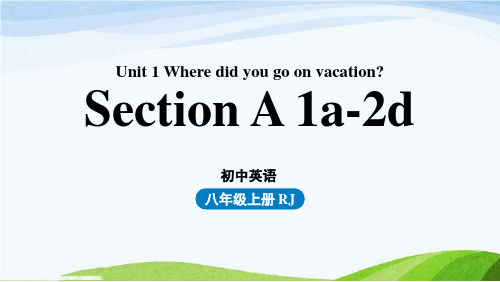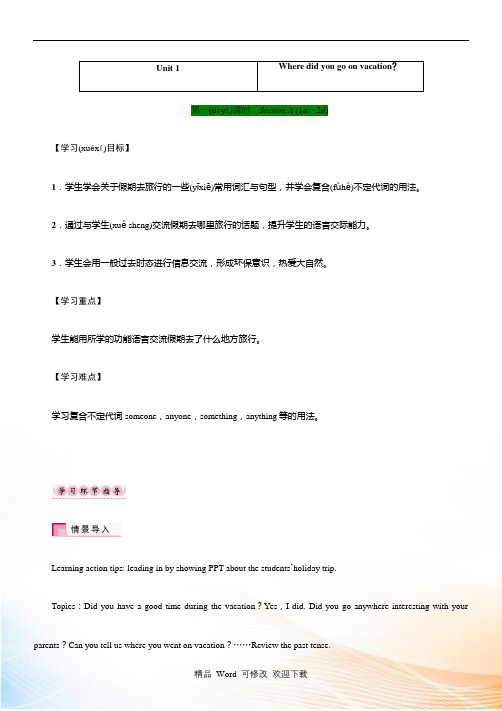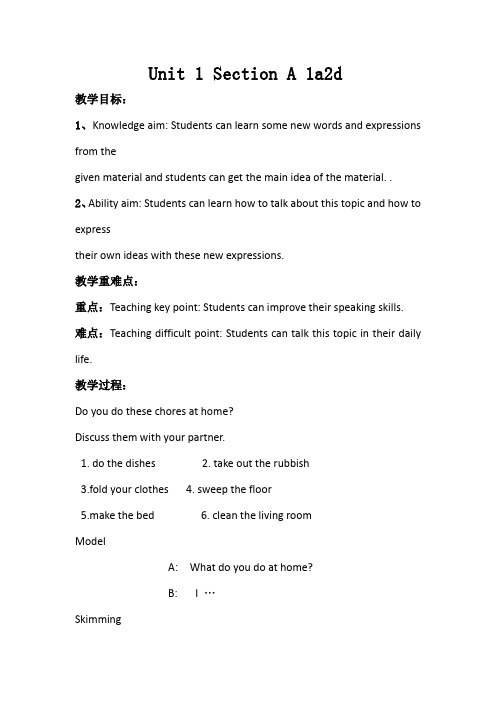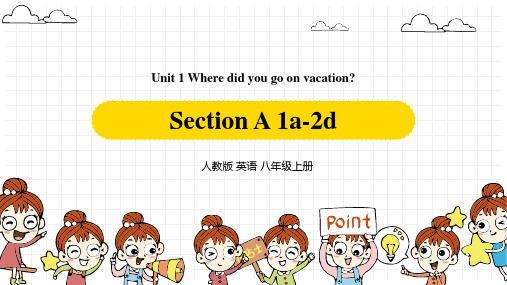八年级英语上册Unit1第一课时 Section A(1a~2d)
新人教英语八上Unit1第一课时(SectionA1a-2d)

1a Match the activities with the pictures[a-g].
待在家里
e 1. stayed at home __f___
bc d
2. went to New York City __b___
a
3. visited my uncle _g____夏令营
4. went to summer camp __d___
相当多的;相当于many adj.精彩的;绝妙的 place in Guizhou. You can see quite a few waterfalls in China, but Huangguoshu Waterfall is very special,
adj.特别的 because it's great and beautiful. It's the biggest waterfall in China.
➢Was there anything interesting on the news this evening?
2c Role-play conversations between Grace, Kevin and Julie.
A: Grace, where did you go on vacation?
1. How was Tina’s trip?
A. Bad.
B. So-so.
√C. Excellent.
2. Who did Tom go to summer camp with?
√A. His friends. B. His family. C. Nobody.
1c Make conversations about the people in the picture.
人教版八年级英语上册 Unit 1 第1课时 Section A (1a-2c)分层作业

Unit 1 Where did you go on vacation?Section A(1a-2c) 第1课时(分层作业)基础达标一、汉译英呆在家里_________去纽约市_________拜访我的叔叔_________ 去夏令营_________去爬山_________ 去海滩_________参观博物馆_________ 大多数时间___________好久不见__________ 相当多____________二、根据要求完成句子1.“你去夏令营了吗?”“不,我没有去。
”—Did you go to ________ ________?—No, ________ ________.2.上个月我去了海滩。
I ________ ________ ________ ________ last month.3.上周我拜访了我的老师。
I ________ my teacher ________ .4.昨天我待在家里,没有出去。
I________ ________ and didn’t go out yesterday.5.朱莉昨天去中心公园了吗?Julie________ to Central Park yesterday?能力提升三、单项选择1.—I didn't hear you come in just now.—That's good. We tried any noise, for you were sleeping.A. not makeB. not to makeC. to makeD. making2.—Did you read today’s newspaper?—No, I didn’t. Is there________ in it?A.something important B.anything special C.new anything D.interesting something3.—Where did you go on vacation?—We ________ to Hefei.A.am going B.will go C.went D.go 4.—What a nice watch! When ________ you ________it?—Three days ago.A.do; buy B.did; boughtC.were; buy D.did; buy5.Everything _____ free. Good luck to you!A.am B.is C.are D.be四、用所给单词的正确形式填空1.Gina and Tim _______ (come)to China last year.2.He ________(go)to see a film yesterday evening.3.I ________(buy)a toy bear for my son this morning.4.I _________(stay)at home and ________(watch)TV last night.5.There ________(be)enough milk at home last week,wasn't there?五、句型转换1. Tom was at home yesterday. (改为一般疑问句)_________Tom home yesterday ?2. Tom went to the library last weekend. (对画线部分提问)_________ __________ Tom ________ last weekend?3. I got up at seven o’clock this morning.(对画线部分提问)________ ________ ________ you _________ ________this morning?4. Grace played volleyball after school yesterday. (对画线部分提问)Grace ________after school yesterday?5. Mr. Smith found something new in today’s newspaper. (改为否定句)Mr. Smith ________ ________ new in today’s newspaper.拓展训练六、阅读下面短文,按照句子结构的语法性和上下文连贯的要求,在空白处填入一个适当的词或使用括号中词语的正确形式填空。
人教版八年级英语上册Unit 1 Section A 第一课时 (1a-2d)

go out with
✔
anyone?
Discussion
Talk about your vacation plans with your friends and fill in the chart.
Name Vacation plans Who? When?
I decided to go to … David went there last summer vacation. The weather there was … The food … I think it was … So I want to go there next vacation.
picture [1-5].
Where did you go on vacation?I went to
the
2mountai 1 ns.
4
53
1. Tina 2. Xiang Hua 3. Sally 4. Bob 5. Tom
1c Make conversations about the people in the picture.
2c Role-play conversations between Grace, Kevin and Julie.
A: Grace, where did you go on vacation?
B: I went to New York City. A: Oh, really? Did you go with
RJ八(上) 教学课件
学八练年优级八英年语级(英RJ语上上)(RJ) 教教学学课课件件
Where did you go on vacation?
Section A (1a-2d)
➢ Key words & phrases:
最新人教版八年级英语上Unit1 第一课时 Section A(1a - 2d) 教学设计

Unit 1 Where did you go on vacation?第一(dìyī)课时Section A (1a~2d)【学习(xuéxí)目标】1.学生学会关于假期去旅行的一些(yīxiē)常用词汇与句型,并学会复合(fùhé)不定代词的用法。
2.通过与学生(xué sheng)交流假期去哪里旅行的话题,提升学生的语言交际能力。
3.学生会用一般过去时态进行信息交流,形成环保意识,热爱大自然。
【学习重点】学生能用所学的功能语言交流假期去了什么地方旅行。
【学习难点】学习复合不定代词someone,anyone,something,anything等的用法。
Learning action tips: leading in by showing PPT about the students’holiday trip.Topics:Did you have a good time during the vacation?Yes,I did. Did you go anywhere interesting with your parents?Can you tell us where you went on vacation?……Review the past tense.Task 1Learning action tips: Preview the words on Page2 in the word list. Students read the words by phonetic symbols, then underline new words in the text and mark the Chinese meaning. At last finish the task in 1a.【知识(zhī shi)链接】1.复合不定(bùdìng)代词有:某人(mǒu rén)someone任何人anyone没有(méi yǒu)人no one每个人everyone某事something任何(rènhé)事anything没有东西nothing一切everything2.anyone与any one的区别anyone通常指人,侧重于个体,后面不带of;any one既指人,又指物,侧重于整体,后面可接of。
Unit1SectionA1a-2d教案(五四制)英语八年级上册

Unit 1 Section A 1a2d教学目标:1、Knowledge aim: Students can learn some new words and expressions from thegiven material and students can get the main idea of the material. .2、Ability aim: Students can learn how to talk about this topic and how to expresstheir own ideas with these new expressions.教学重难点:重点:Teaching key point: Students can improve their speaking skills.难点:Teaching difficult point: Students can talk this topic in their daily life.教学过程:Do you do these chores at home?Discuss them with your partner.1. do the dishes2. take out the rubbish3.fold your clothes4. sweep the floor5.make the bed6. clean the living roomModelA: What do you do at home?B: I …SkimmingThis means looking quickly through a piece of writing to find the main idea without reading every word. It is still a good idea to read the first sentence in each paragraph a little more carefully.They are probably about whether kids should________.A. spend time on schoolworkB. help out with chores at homeC. learn to be independent(独立的)Dear Sir,I do not understand why some parents make their kids help with housework and chores at home. Kids these days already have enough stress from school.They do not have time to study and do housework, too. Housework is a waste of their time. Could we just let them do their job as students? They should spend their time on schoolwork in order to get good grades and get into a good university. Also, when they get older, they will have to do housework so there is no need for them to doit now. It is the parents’job to provide a clean and fortable environment at home for their children. And anyway, I think doing chores is not so difficult. I do not mind doing them.Ms. MillerDear Sir,I think it is important for children to learn how to do chores and helptheir parents with housework. It is not enough to just get good grades at school. Children these days depend on their parents too much. They are always asking, “Could you get this for me?”or “Could you help me with that?”Doing chores helps to develop children's independence and teaches them how to look after themselves. Italso helps them to understand the idea of fairness. Since they live in one house with their parents, they should know that everyone should do their part in keeping it clean and tidy. Our neighbors’son got into a good college but during his first year, he had no idea how to take care of himself. As a result, he often fell ill and his grades dropped. The earlier kids learn to be independent, the better it is for their future.Mr. SmithMake conversations between Peter and his father.Ask for permission礼貌地取得同意A: Could I use your puter?B: Sorry. I'm going to work on it now.A: Well, could I watch TV?B: Yes, you can, but first you have to clean your room.homework.Help your parents do housework..Make a new conversation about housework.DiscussionQ1: Do you help your parents do the chores at home?Q2: Do you ask your parents’permission for?Q3: Do your parents ask you to do some things for them? What do your parents ask you to do?study harddo choresgo to the store/supermarket to buy things for them。
人教版八年级上册英语 Unit 1 Section A (1a-2d) 授课课件

是指某些人或物中的“任何一个”,用来表明只限一个
辨析:anyone, anybody与anyone
都指“任何人”,其后一般不接 anybo of,作主语时,谓语动词用第三
dy, 人称单数形式。 anyon 后面不可接动词的否定形式;如
e 果要表达全部否定, 主语用 nobody。 是指某些人或物中的“任何一
.
课文呈现
1c. Makeconversationsaboutthepeopleinthepicture. A:WheredidTinagoonvacation? B:Shewenttothemountains.
课文呈现
People Grace Kevin Julie
Places
Thebeach Home
考点精讲
考点5 quiteafew相当多;不少
修饰可数名词 复数,相当于 many和quite a lot of。
e.g. Quiteafewstudentsgotoschoolbybike.
相当多的学生骑自行车上学。
拓 展 : quitealittle 表 示 “ 相 当 多 ; 不 少 ” , 相 当 于
考点精讲
③Oh, didyougoanywhereinteresting?
考点3 (重点)anywhere/'eniweə/adv. 在任何地方 形容词修饰复合不定代词、不定副词时,位于不定 代词、不定副词的后边。
anywhere常用于否定句和疑问句中,表示“在任何 地方”;如果用在肯定句中,表示“在(或去)任 何地方,随便哪个地方”。
? Grace: Yes. I went with my mother. Boy: Did you go to Central Park? Grace: Yes, I did. It was really nice. Boy: Did you buy anything special? Grace: Yes. I bought something for my f
Unit1SectionA(1a_2d)课件人教版英语八年级上册

Rick: Hi, Helen. _L_o_n__g_t_im__e_n_o__s_e_e._____ Helen: Hi, Rick. Yes, I was on vacation last month. Rick: Oh, did you go _a_n_y_w__h_e_re__in_t_e_r_e_s_ti_n_g__? Helen: Yes, I went to Guizhou with my family. Rick: Wow! Did you see Huangguoshu Waterfall? Helen: Yes, I did. It was wonderful! We took _q_u_i_t_e_a_f_e_w photos there. What about you?
Did you do anything interesting?
Yes, I did. I went to summer camp visited the museums
And I ate something delicious.
Did you eat anything delicious?
ate dorayaki
“后置”:复合不定代词 + adj.
I can see someone new in your group.
复合不定代词 + adj.
当堂检测
一、根据要求完成句子。 1.They played basketball yesterday.(对划线部分提问)
_W__h_a__t ___d__id__ they ____d_o___ yesterday?
Helen went to Guizhou with...... And she saw....
2020人教版英语八上Unit1Where did you go on vacation第一课时(SectionA1a-2d)

everyone someone
意为“每人;人人”。
意为“某人”;通常用 于肯定句。
Post-listening
Language points
3. buy anything special (教材P2 2b)
Point 形容词修饰复合不定代词
special修饰anything。当形容词修饰复合不定代词时,要放在复合不定代词 的后面,“不定代词+adj.”。 ➢ Did you find anything funny in the book? ➢ Was there anything interesting on the news this evening?
While-listening
2a Listen. Where did the people go on vacation?
People Grace Kevin Julie
Place New York City, Central Park
the beach stayed at home
While-listening
Post-listening
Language points
5. We took quite a few photos there. (教材P2 2d)
Point1 take photos拍照 take photos意为“拍照”。take photos/a photo of 意为“给……拍照”。 ➢ Mr. White likes taking photos of flowers.
√
√ √
√
√ √
备考
√
√
Post-listening
Language points
